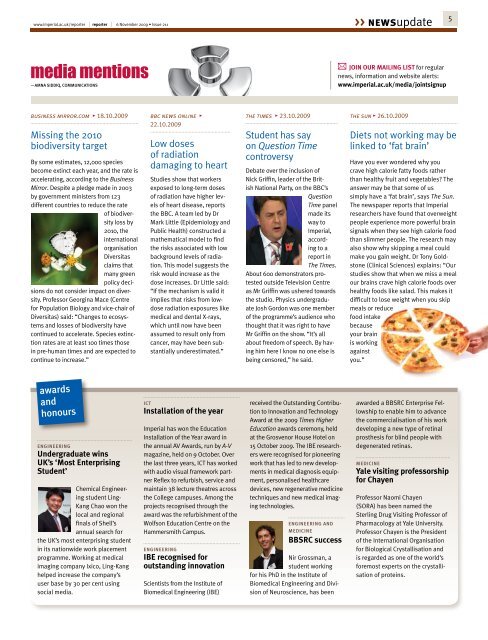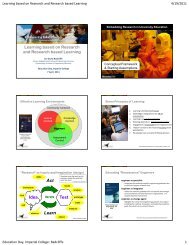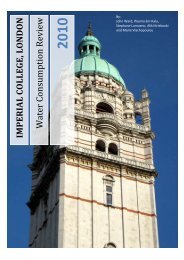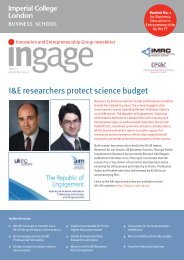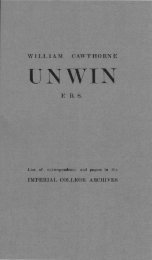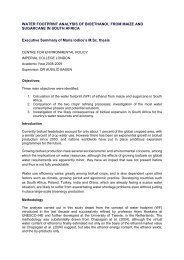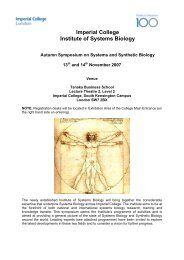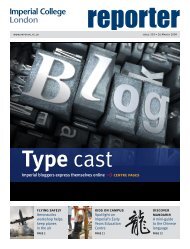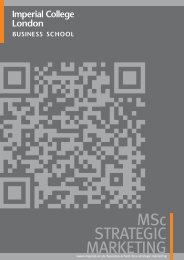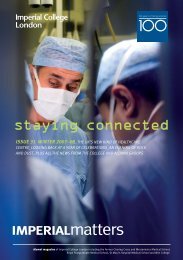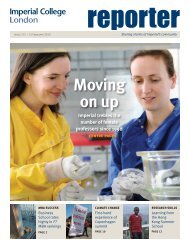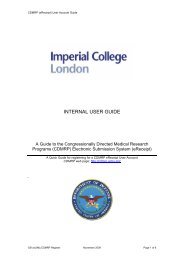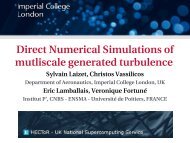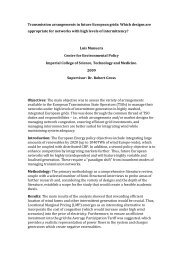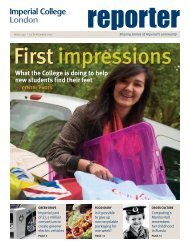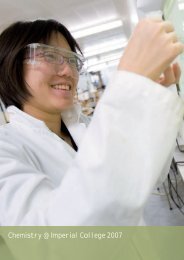211 pdf - Imperial College London
211 pdf - Imperial College London
211 pdf - Imperial College London
Create successful ePaper yourself
Turn your PDF publications into a flip-book with our unique Google optimized e-Paper software.
www.imperial.ac.uk/reporter | reporter | 6 November 2009 • Issue <strong>211</strong> >> newsupdate<br />
5<br />
media mentions<br />
—amna siddiq, Communications<br />
Join our mailing list for regular<br />
news, information and website alerts:<br />
www.imperial.ac.uk/media/jointsignup<br />
business mirror.com • 18.10.2009<br />
Missing the 2010<br />
biodiversity target<br />
By some estimates, 12,000 species<br />
become extinct each year, and the rate is<br />
accelerating, according to the Business<br />
Mirror. Despite a pledge made in 2003<br />
by government ministers from 123<br />
different countries to reduce the rate<br />
of biodiversity<br />
loss by<br />
2010, the<br />
international<br />
organisation<br />
Diversitas<br />
claims that<br />
many green<br />
policy decisions<br />
do not consider impact on diversity.<br />
Professor Georgina Mace (Centre<br />
for Population Biology and vice-chair of<br />
Diversitas) said: “Changes to ecosystems<br />
and losses of biodiversity have<br />
continued to accelerate. Species extinction<br />
rates are at least 100 times those<br />
in pre-human times and are expected to<br />
continue to increase.”<br />
bbc news online •<br />
22.10.2009<br />
Low doses<br />
of radiation<br />
damaging to heart<br />
Studies show that workers<br />
exposed to long-term doses<br />
of radiation have higher levels<br />
of heart disease, reports<br />
the BBC. A team led by Dr<br />
Mark Little (Epidemiology and<br />
Public Health) constructed a<br />
mathematical model to find<br />
the risks associated with low<br />
background levels of radiation.<br />
This model suggests the<br />
risk would increase as the<br />
dose increases. Dr Little said:<br />
“If the mechanism is valid it<br />
implies that risks from lowdose<br />
radiation exposures like<br />
medical and dental X-rays,<br />
which until now have been<br />
assumed to result only from<br />
cancer, may have been substantially<br />
underestimated.”<br />
the times • 23.10.2009<br />
Student has say<br />
on Question Time<br />
controversy<br />
Debate over the inclusion of<br />
Nick Griffin, leader of the British<br />
National Party, on the BBC’s<br />
Question<br />
Time panel<br />
made its<br />
way to<br />
<strong>Imperial</strong>,<br />
according<br />
to a<br />
report in<br />
The Times.<br />
About 600 demonstrators protested<br />
outside Television Centre<br />
as Mr Griffin was ushered towards<br />
the studio. Physics undergraduate<br />
Josh Gordon was one member<br />
of the programme’s audience who<br />
thought that it was right to have<br />
Mr Griffin on the show. “It’s all<br />
about freedom of speech. By having<br />
him here I know no one else is<br />
being censored,” he said.<br />
the sun • 26.10.2009<br />
Diets not working may be<br />
linked to ‘fat brain’<br />
Have you ever wondered why you<br />
crave high calorie fatty foods rather<br />
than healthy fruit and vegetables? The<br />
answer may be that some of us<br />
simply have a ‘fat brain’, says The Sun.<br />
The newspaper reports that <strong>Imperial</strong><br />
researchers have found that overweight<br />
people experience more powerful brain<br />
signals when they see high calorie food<br />
than slimmer people. The research may<br />
also show why skipping a meal could<br />
make you gain weight. Dr Tony Goldstone<br />
(Clinical Sciences) explains: “Our<br />
studies show that when we miss a meal<br />
our brains crave high calorie foods over<br />
healthy foods like salad. This makes it<br />
difficult to lose weight when you skip<br />
meals or reduce<br />
food intake<br />
because<br />
your brain<br />
is working<br />
against<br />
you.”<br />
awards<br />
and<br />
honours<br />
engineering<br />
Undergraduate wins<br />
UK’s ‘Most Enterprising<br />
Student’<br />
Chemical Engineering<br />
student Ling-<br />
Kang Chao won the<br />
local and regional<br />
finals of Shell’s<br />
annual search for<br />
the UK’s most enterprising student<br />
in its nationwide work placement<br />
programme. Working at medical<br />
imaging company Ixico, Ling-Kang<br />
helped increase the company’s<br />
user base by 30 per cent using<br />
social media.<br />
ICT<br />
Installation of the year<br />
<strong>Imperial</strong> has won the Education<br />
Installation of the Year award in<br />
the annual AV Awards, run by A-V<br />
magazine, held on 9 October. Over<br />
the last three years, ICT has worked<br />
with audio visual framework partner<br />
Reflex to refurbish, service and<br />
maintain 38 lecture theatres across<br />
the <strong>College</strong> campuses. Among the<br />
projects recognised through the<br />
award was the refurbishment of the<br />
Wolfson Education Centre on the<br />
Hammersmith Campus.<br />
engineering<br />
IBE recognised for<br />
outstanding innovation<br />
Scientists from the Institute of<br />
Biomedical Engineering (IBE)<br />
received the Outstanding Contribution<br />
to Innovation and Technology<br />
Award at the 2009 Times Higher<br />
Education awards ceremony, held<br />
at the Grosvenor House Hotel on<br />
15 October 2009. The IBE researchers<br />
were recognised for pioneering<br />
work that has led to new developments<br />
in medical diagnosis equipment,<br />
personalised healthcare<br />
devices, new regenerative medicine<br />
techniques and new medical imaging<br />
technologies.<br />
engineering and<br />
medicine<br />
BBSRC success<br />
Nir Grossman, a<br />
student working<br />
for his PhD in the Institute of<br />
Biomedical Engineering and Division<br />
of Neuroscience, has been<br />
awarded a BBSRC Enterprise Fellowship<br />
to enable him to advance<br />
the commercialisation of his work<br />
developing a new type of retinal<br />
prosthesis for blind people with<br />
degenerated retinas.<br />
medicine<br />
Yale visiting professorship<br />
for Chayen<br />
Professor Naomi Chayen<br />
(SORA) has been named the<br />
Sterling Drug Visiting Professor of<br />
Pharmacology at Yale University.<br />
Professor Chayen is the President<br />
of the International Organisation<br />
for Biological Crystallisation and<br />
is regarded as one of the world’s<br />
foremost experts on the crystallisation<br />
of proteins.


